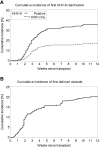HHV-6 reactivation and its effect on delirium and cognitive functioning in hematopoietic cell transplantation recipients
- PMID: 21389320
- PMCID: PMC3109545
- DOI: 10.1182/blood-2010-10-316083
HHV-6 reactivation and its effect on delirium and cognitive functioning in hematopoietic cell transplantation recipients
Abstract
Human herpesvirus 6 (HHV-6) is detected in the plasma of approximately 40% of patients undergoing hematopoietic cell transplantation (HCT) and sporadically causes encephalitis in this population. The effect of HHV-6 reactivation on central nervous system function has not been fully characterized. This prospective study aimed to evaluate associations between HHV-6 reactivation and central nervous system dysfunction after allogeneic HCT. Patients were enrolled before HCT. Plasma samples were tested for HHV-6 at baseline and twice weekly after transplantation until day 84. Delirium was assessed at baseline, 3 times weekly until day 56, and weekly on days 56 to 84 using a validated instrument. Neurocognitive testing was performed at baseline and at approximately day 84. HHV-6 was detected in 111 (35%) of the 315 included patients. Patients with HHV-6 were more likely to develop delirium (adjusted odds ratio = 2.5; 95% confidence interval, 1.2-5.3) and demonstrate neurocognitive decline (adjusted odds ratio = 2.6; 95% confidence interval, 1.1-6.2) in the first 84 days after HCT. Cord blood and unrelated transplantation increased risk of HHV-6 reactivation. These data provide the basis to conduct a randomized clinical trial to determine whether prevention of HHV-6 reactivation will reduce neurocognitive morbidity in HCT recipients.
Figures
References
-
- Hentrich M, Oruzio D, Jager G, et al. Impact of human herpesvirus-6 after haematopoietic stem cell transplantation. Br J Haematol. 2005;128(1):66–72. - PubMed
-
- Imbert-Marcille BM, Tang XW, Lepelletier D, et al. Human herpesvirus 6 infection after autologous or allogeneic stem cell transplantation: a single-center prospective longitudinal study of 92 patients. Clin Infect Dis. 2000;31(4):881–886. - PubMed
-
- Zerr DM, Corey L, Kim HW, Huang ML, Nguy L, Boeckh M. Clinical outcomes of human herpesvirus 6 reactivation after hematopoietic stem cell transplantation. Clin Infect Dis. 2005;40(7):932–940. - PubMed
-
- Wainwright MS, Martin PL, Morse RP, et al. Human herpesvirus 6 limbic encephalitis after stem cell transplantation. Ann Neurol. 2001;50(5):612–619. - PubMed
-
- Zerr DM. Human herpesvirus 6 and central nervous system disease in hematopoietic cell transplantation. J Clin Virol. 2006;37(suppl 1):S52–S56. - PubMed
Publication types
MeSH terms
Grants and funding
LinkOut - more resources
Full Text Sources
Other Literature Sources
Medical



